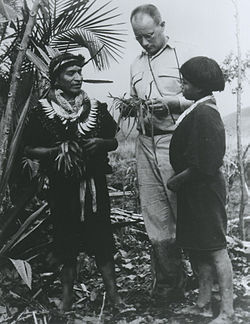“Ethnobotany
(Eth-noh-bot-n-ee)
From Wikipedia, the free encyclopedia
Ethnobotany (from ethnology, study of culture,[1] and botany, study of plants) is the scientific study of the relationships that exist between peoples and plants.
Ethnobotanists aim to document, describe and explain complex relationships between cultures and (uses of) plants, focusing primarily on how plants are used, managed and perceived across human societies. This includes use for food, clothing, currency, ritual, medicine, dye, construction, cosmetics and a lot more.[2] Richard Evans Schultes, called the “father of ethnobotany”,[3] explained the discipline in this way:
Ethnobotany simply means […] investigating plants used by primitive societies in various parts of the world.[4]
Intellectual property rights and benefit-sharing arrangements are important issues in ethnobotany.[5]“
Cape Ann is a GOLDMINE of wild food and medicine. Just Sayin’

